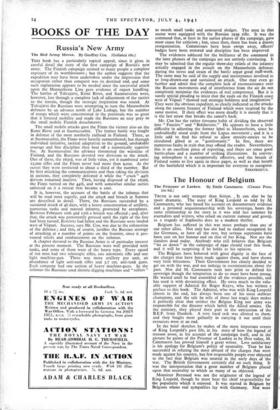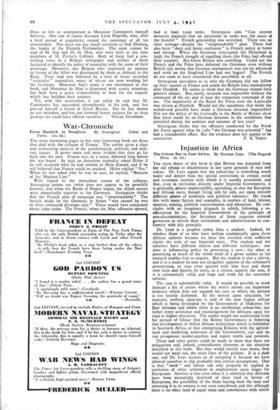The Honour of Belgium
TRUTH is not only stranger than fiction. It can also be far more dramatic. The story of King Leopold as told by M. Cammaerts, who has based his account on documentary evidence and a personal acquaintanceship with his sovereign, bears the same relationship to the story as it was told last summer by journalists and writers, who relied on current rumour and gossip, as a tragedy of Sophocles does to a modem thriller.
Belgium has suffered in this war more perhaps than any of our other allies. Not only has she had to endure occupation by the Germans, as have all the rest, but serious aspersions have been cast on her honour and on that of her King. Nor are the slanders dead today. Anybody who still believes that Belgium " let us down " in the campaign of 1940 should read this book, and it will be surprising if he holds to his opinion.
The Belgians have behaved with great dignity in the face of the charges that have been made against them, and have shown very little bitterness.- Their Government has clearly decided to get on with the war, and not indulge in recriminations about the past. Nor did M. Canunaerts rush into print to defend his sovereign though the temptation to do so must have been strong. He waited until he had assembled all the evidence possible, and has used it with devastating effect. He owes much to the valu- able support of Admiral Six Roger Keyes, who has written a preface to this book. The Admiral, who was with King Leopold almost to the end, has always been one of his most stalwart champions, and the tale he tells of those last tragic days makes it perfectly clear that neither the Belgian King nor army was responsible for the disaster which befell the Allied armies. On the contrary, they played their part in the extrication of the B.E.F. from Dunkirk. A very hard task was allotted to them, and they fought most gallantly in carrying it out until their resources were at an end.
In the brief sketches he makes of the most important events of King Leopold's past life, in his story of-how the legend of treason arose, in his account of the campaign itself, and in the picture he paints of the Prisoner of Laeken as he lives today, M. Cammaerts has proved himself a great writer. Less satisfactory is his apology for Belgium's policy of neutrality. True he has succeeded in refuting the most absurd of the charges that were made against his country, but few responsible people ever objected to the fact that Belgium was neutral in the early days of the war. The British Government certainly did no such thing. It was the interpretation that a great number of Belgians placed upon that neutrality to which so many of us objected.
Monsieur Reynaud was not the originator of the legend of King Leopold, though he must bear the chief responsibility for the popularity which it enjoyed. It was started in Belgium by Belgians whose real synipathies lay with Germany. Nor were these so few or unimportant as Monsieur Cammaerts himself believes. One can of course discount Leon Degrelle, who, after a brief period of popularity, earned the contempt of all his countrymen. Nor need one pay much attention to Staf Declerq, the leader of the Flemish Nationalists. The same cannot be said of M. Sap and M. de Man, who were both at one time members of M. Pierlot's Cabinet. Both of them had a con- trolling voice in a Belgian newspaper and neither of them hesitated to identify the policy of neutrality with the name of their sovereign. Moreover, any Belgian who expressed an opinion in favour of the Allies was denounced by them as disloyal to the King. Their lead was followed by a host of lesser so-called " neutralist " journalists, many of whom are now working for the Germans. Monsieur Sap's name is not mentioned in this book, and Monsieur de Man is dismissed with scanty attention, but both have a grave responsibility to bear for the tragedy which has befallen their country.
Yet, with this reservation, it can safely be said that M. Cammaerts has succeeded triumphantly in his task, and has proved himself a friend of Great Britain. For he has shown us our mistakes, and has put forward better excuses for us than perhaps we could have offered ourselves. VIVIAN SAUNDERS.































 Previous page
Previous page